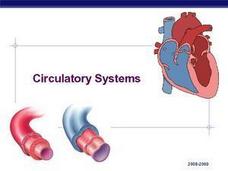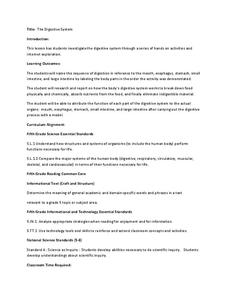Curated OER
Human Skeleton
Promote reading comprehension and practice naming parts of the human skeleton with this online interactive worksheet! Scholars read about the functions of the human skeletal system, then work online to label a diagram by filling in 18...
Curated OER
Life Cycle: Diversity in a Balance 4th Grade Workbook
In this life cycle workbook, 5th graders examine plant and animal cells, classification of organisms, human biology, photosynthesis, and natural environments. 21 different activities make up the Life Cycle Workbook.
Curated OER
The Animal Body and How it Moves
Spark interest in the body structure of vertebrates with this comprehensive and colorful learning exercise. Your biology class will explore the levels of organization, primary tissue types, and the main organ systems. Finally, they hone...
Curated OER
Fetal Pig: Circulatory System
Step-by-step instructions for fetal pig dissection and viewing of the circulatory system is given in this exercise. Your young biologists match the names to the organs or label a diagram of the pig circulatory system. This resource is...
Curated OER
The Female Reproductive System
Students research female reproductive issues. They create a presentation, in small groups, that focuses on one particular helath issue involving the female repro=ductive system.
Curated OER
My Body
Assist your littlest learners in identifying the parts of their bodies. Each slide contains a labeled image of an individual body part. Arms, legs, hands, and feet to mention a few. Tip: Turn this visual presentation into a kinesthetic...
Curated OER
The Mind-Body Connection
Second graders learn about the human body. For this biology lesson plan, 2nd graders will begin with the basics of understanding charts and graphs and progress into units that cover the body systems, and mental and emotional health....
Curated OER
Human Body Corporation
Students communicate about the human body. They write letters to simulate the Human Body Corporation. They select an organ and explain its importance in the human body including its name, systems, functions, and how the functions are...
Curated OER
Human Body Quest
In this biology worksheet, students describe and name their organ system selected and its major functions. Then they create a diagram of their body system with the major parts and organs labeled. Students also write facts about their...
Children’s Hospital of Philadelphia
Organs and Tissues of the Immune System
It's virus-fighting time! Pupils learn how viruses attack and reproduce and how the immune system works to protect the body. They identify unfamiliar terms and tissues and organs of the immune system. Working in small groups, scholars...
Curated OER
The Heart of the Matter
Upper elementary pupils learn about the blood transportation system and anatomy of the human heart. They fill in an outline of the human heart (not included) focusing on the flow of blood to and from the heart. Using stethoscopes, they...
Curated OER
Circulatory Systems
A slideshow that covers the all-important details related to basic human circulation. The reasoning for exchange of material methods is presented and then labeled diagrams of the main human transfer systems are shown, along with...
Curated OER
The Digestive System
Discover how the human body's digestive system works with a brain and stomach friendly activity. Scholars taste test a variety of foods to find out how they behave once in the mouth. Class members then play a game called Move That...
Curated OER
All About Teeth
Chomp chomp! Learn which teeth perform which tasks with a thorough worksheet on molars, incisors, and canines. Based on descriptions of each kind of tooth, fifth graders label a diagram that points to particular teeth. They then color in...
Curated OER
Biology: Humans as Organisms
Students examine body systems. In this biology lesson, students explore the roles of different body systems and discover the effects of smoking, drugs, alcohol, exercise, and good nutrition on human body systems.
Curated OER
Human Excretion: Living Environment
A solid review of the excretion system that presents diagrams and asks learners to name the labelled parts or to identify which parts perform the particular jobs stated.
Curated OER
Bite on This!
Different types of teeth have different roles. Third graders study how molars, incisors, and canines function in a rabbit skull and a cat skull. After answering some questions about the teeth of herbivores and carnivores, kids...
Ask a Biologist
Human Skeleton Anatomy Activity
Young biologists piece together the puzzle of the human body with this simple anatomy worksheet. Presented with a picture of the human skeleton, students are challenged with the task of correctly identifying the 27 bones indicated on the...
Curated OER
Fingerprint Fun
In this science worksheet, students investigate the unique characteristics of human fingerprints by first making a print of every digit in the labeled boxes. Students then examine their fingerprints, looking for an arch, whorl or loop.
Curated OER
Sympathetic Division of the Autonomic Nervous System
In this anatomy worksheet, students label the autonomic nervous system. Students focus on the sympathetic division of the system. The locations along the spine are linked with pictures of the organs.
Curated OER
Skeletal System
Seventh graders identify and label twenty-five bones of the skeletal system. In small groups they glue various types of dried pasta to a large human body outline. They attach the pasta to the outline and label the pasta bones.
Common Sense Press
What is the Skeletal System?
Students investigate the human skeletal system. For this biology lesson, students trace the outline of their body onto butcher paper and fill in the names of the bones. Students use an overhead transparency of the human skeletal system...
Curated OER
How to Make a Model of the Human Respiratory System
Students label parts of the human respiratory system on a diagram. They explain the function of diaphragm.
Museum of Science
Virtual Heart
No more beating the pavement to find a virtual model of the human heart. See one in continual real-time motion, and layer it to highlight electrical impulses, blood flow, and valve activity.

























